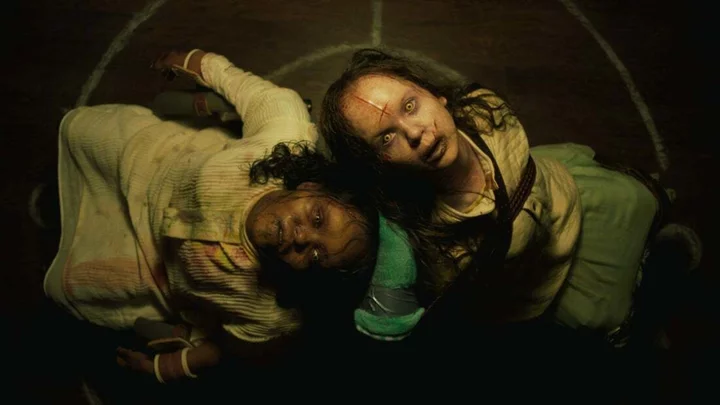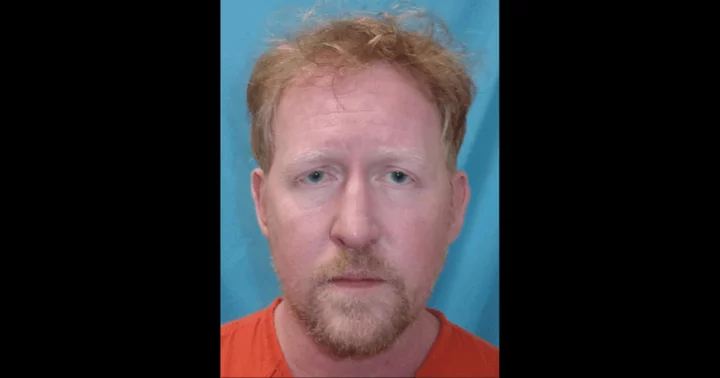There are demons, and there are demons. While the horror genre is rife with possession films, and many of them are definitely worth watching (hello, Evil Dead!), few have matched the level of fear and originality, not to mention the overall quality, of the series that first put white eyes, a growling voice, and pea soup all over the horror map 50 years ago.
Now, the spirit of the box office has compelled David Gordon Green to do what he did with Halloween and bring The Exorcist back for a whole new generation. This October, The Exorcist: Believer, a direct sequel to the original film, arrives in theaters. The sixth film in the series is intended to launch a new trilogy, with The Exorcist: Deceiver expected next year.
However, the last film in the official series reached movie screens way back in 2005. So, if you're having trouble keeping your priests and your Pazuzus straight, have no fear! We're here to save your soul, or at least your time, with what you need to know.
The Exorcist (1973) remains an unmatched classic.
Linda Blair starred as Regan in "The Exorcist." Credit: Warner Bros/Hoya Prods/Kobal/ShutterstockA half-century after its release, The Exorcist is still a high-water mark of horror cinema. Arriving in the wave of intelligent supernatural horror films that followed Roman Polanski's Rosemary's Baby in 1968, it was not the first movie about possession. (In fact, Shirley MacLaine, who was the inspiration for the Chris MacNeil character in her friend William Peter Blatty's novel The Exorcist, was considered for the lead in the film, but appeared instead in the all-but-forgotten oddity The Possession of Joel Delaney, released the year prior.) But William Friedkin's film carved a whole new path for horror, and it's been widely considered the scariest movie ever made. Plus, it was the first horror film ever to be nominated for a Best Picture Academy Award.
Based on the novel by William Peter Blatty (who also produced), which was itself based on a 1949 exorcism that Blatty read about while a student at Georgetown University, The Exorcist asks how a modern secular society would handle an attack by a supernatural demonic entity. Ellen Burstyn, who would be nominated for a Best Actress Oscar for her performance, plays Chris MacNeil, a divorced Hollywood actress renting a home in the Georgetown neighborhood of Washington, D.C., with young daughter Regan (Linda Blair) and Regan's tutor Sharon (Kitty Winn) in tow.
When 12-year-old Regan suddenly starts acting strangely — becoming violent, shaking unnaturally, urinating on the rug in the middle of a party — Chris takes her to every medical expert she can, to no effect.
Well, to some effect: Many viewers consider the angiogram scene, in which a technician inserts a catheter into Regan's neck, to be the most disturbing sequence in the film. And that's without knowing the technician filmed would be later arrested for murdering his lover in real life.
Even before we've reached the final act, Friedkin has imbued the early scenes of the film with such dread that it's nearly a relief when the supernatural comes to the fore.
With science offering no answers, it's time to call in the exorcists. Father Damien Karras (the actor and playwright Jason Miller), a young priest whose faith has weakened, and the older and more experienced archaeologist and exorcist Father Lankester Merrin (played by Ingmar Bergman favorite Max von Sydow) are summoned to perform the rite. The Catholic Rituale Romanum intends to drive out the malevolent spirit, identified as the Babylonian demon Pazuzu, but likely a manifestation of the devil himself.
In the grueling final act, the girl's bedroom becomes a horror chamber as the priests, her mother, and the audience are subjected to blasphemous acts, projectile vomiting, Tarantino levels of profanity, and the sight of Regan's head spinning around before the demon is expelled. In the process, the family is put through hell, and both priests die.
SEE ALSO: The scariest horror movies on Shudder to keep you up at nightFriedkin's film is brilliantly constructed, utilizing makeup effects, refrigerated sets, subliminal images, strange sound effects, a previously unreleased prog rock song ("Tubular Bells" by Mike Oldfield), forced perspective, and eerie images to make us feel like we're in the presence of evil. The Exorcist also tapped into a timely theological argument about the nature of evil. What if it's not simply a metaphor or a way of describing human actions, but an actual presence in the world that seeks to take us over? The prospect is terrifying. Some devout viewers actually feared the movie itself would possess them.
Not that people stayed away. The Exorcist was a box office phenomenon, likely because it also offered scares for the whole family. If they could get into an R-rated movie, teenagers would be terrified at the notion of an evil presence taking control of their body, while parents who went together could relate to the fear of their child turning into someone vile and vulgar who might despise or even hurt Mom and Dad. In the Vietnam era, fears of youth gone wicked were highly potent.
How to watch: The Exorcist is streaming on Max, Apple TV+, and Amazon Prime.
Exorcist rip-offs: Their name is Legion.
Not surprisingly, the success of The Exorcist led to the arrival of a number of films from around the world that did not, ahem, possess the same spirit of originality. Some of the most memorable copycats included Abby, a Blaxploitation take on The Exorcist; Şeytan, the Turkish Exorcist; Repossessed, the inevitable Leslie Nielsen spoof with Linda Blair poking fun at her most famous role; and The Manitou, a frankly bonkers film in which Tony Curtis battles a vengeful Native American spirit growing out from the back of a woman's neck while in a hospital room that suddenly appears to be in outer space!
Perhaps the most blatant rip-off was Beyond the Door, a similarly bizarre take narrated by Satan (actually, Robert Booth) and produced by the legendary Greek exploitation mastermind Ovidio G. Assonitis. Here, a mother of two absurdly foul-mouthed children is herself possessed in order to give birth to Satan, Jr. In fact, this imitation was so blatant that Twentieth Century Fox actually sued the filmmakers, as they had also sued American International Pictures over Abby. The results were different: American International dropped Abby, making it fairly hard to find even today, while the Beyond the Door lawsuit dragged on for five years before a monetary settlement was reached. By that time, Beyond the Door had grossed $15 million, a sequel-in-name-only had been released, another would appear in 1989, and a third sequel is now on the way! Will it come out in time to compete with The Exorcist: Believer?
Are there any non-canon exorcism films that you still need to see? Yes, there is one, but we’ll get to that, after we find out what the legitimate title-holders did to their offspring.
How to Watch: Repossessed is on Roku; Şeytan is on Tubi; The Manitou is on Amazon Prime; Beyond the Door is on Shudder; Abby is unavailable for legitimate streaming.
Exorcist II: The Heretic (1977) makes for an intriguing misfire.
Linda Blair starred as Regan in "Exorcist II: The Heretic." Credit: Warner Bros/Kobal/ShutterstockExorcist II: The Heretic had everything going for it. Playwright William Goodhart's first-draft script was loved by everyone involved. Linda Blair and Max von Sydow returned, joined by Louise Fletcher, James Earl Jones, and Richard Burton. The success of the first film meant its sequel boasted a big budget, epic scope, and the visionary director of Deliverance and Zardoz, John Boorman, producing and directing. And yet, it's been called the worst sequel ever made and was widely considered a catastrophic failure. Still, no less an authority on cinema and theology than Martin Scorsese has actually championed the film, preferring it to the original.
So, what the hell?
If anything, Exorcist II: The Heretic is an intriguing misfire, a film with so many ideas and subplots it's hard to keep track of them. In the main storyline, Richard Burton plays Father Philip Lamont, a priest struggling with his faith after a botched exorcism in Latin America. He has now been assigned to investigate the death of Father Merrin four years earlier in Georgetown. Merrin's writings about Satan and evil have become controversial to a Church that hopes to modernize. And Merrin himself appears in visions and flashbacks to help Lamont. Von Sydow, incidentally, appears without the aid of any de-aging. Few viewers realize the actor was in his early forties in the first film, thanks to the astounding old-age makeup by Dick Smith.
Regan (the returning Linda Blair) has grown up and blocked out memories of the earlier exorcism. She's living her best, or at least least-possessed, life in New York, tap dancing off-Broadway and working with a therapist (Louise Fletcher) whose "synchronized hypnosis" method seemingly activates Regan's latent telepathic and astral projection abilities. The film hints that there is a universal world-mind, and Regan is destined to save humanity from evil. Tap dancing will have to wait.
SEE ALSO: 'Slotherhouse' review: Killer sloth horror is every bit as ridiculous as it soundsNext thing you know, Regan is receiving direct messages from Pazuzu in the form of a talking locust in Africa. Meanwhile, Father Lamont is maxing out his travel budget shuttling between NYC, the cliff churches of Ethiopia, and the Vatican, where he's in hot water. In order to save the girl, still lightly possessed by Pazuzu, he must locate a formerly possessed African boy who was once saved by Father Merrin, and who might hold the secret of why the demon attacks children with emerging healing powers.
Somewhere in the mess that is Exorcist II: The Heretic lies a compelling film with some striking visuals — a smiling girl being burned alive or a village fighting off a plague of locusts — that hint at something greater. Unfortunately, there's also hammy Richard Burton delivering lines like, "Don't you see... Your machine has proved scientifically there's an ancient demon locked inside her," and James Earl Jones in a locust costume. The script got at least five rewrites, and parapsychologists were brought in to advise. There were at least three different cuts, but nothing helped.
Beyond miscasting and studio interference, the main problem with Exorcist II is that audiences have a hard time being scared during a film when they're also trying to keep straight what the hell is going on!
If curiosity compels you to check out Exorcist II, feel free, but the series makes perfect sense, and probably more sense, without it.
How to watch: Exorcist II: The Heretic is streaming on Max.
The Exorcist III (1990) is a hidden gem.
Jason Miller stars in "The Exorcist III." Credit: Moviestore/ShutterstockThe epic failure of Exorcist II likely overshadowed the film that really is the rediscovered masterpiece of the series, The Exorcist III, or as it was meant to be called, Legion. William Peter Blatty directed the film, which was adapted from his 1983 novel Legion, and he was as deft at generating scares from images as words. The film is taut, atmospheric, and at points might be just as scary as the original.
Disturbing things are afoot in Georgetown once again. Two minor characters from the original Exorcist story, Lieutenant William F. Kinderman (played here by The Changeling's George C. Scott, replacing the deceased Lee J. Cobb from the first film) and his old friend Father Dyer (Ed Flanders) are trying to make sense of a series of gruesome murders that seem to follow the M.O. of the Gemini Killer, aka James Venamun, a serial killer long since executed. The killings all blasphemously evoke Catholic saints and are all seemingly tied somehow to the death of their mutual friend, Father Karras, 15 years before. Once Dyer is murdered as well, Kinderman goes into overdrive, and Scott's portrayal moves from cranky to mad as hell.
Kinderman comes to question a confined mental patient known only as Patient X, who was found 15 years earlier while wandering with amnesia. Played with scene-stealing glee by Brad Dourif, Patient X claims to be the Gemini Killer himself, but to Kinderman, he seems to also contain the trapped soul of Father Karras. The problem is, both of those men are long dead, and the patient has been locked up during all the recent murders. The investigation becomes a psychological cat-and-mouse game, in which Patient X explains all the help he's received from "the master," who might be Ol' Scratch himself.
While Blatty's Legion attempted to strike out on its own, the malevolent spirit of studio interference demanded a title that indicated its connection to the series and required reshoots to shoehorn in an actual exorcism scene. While that scene is fairly effective, it still feels like an afterthought. When the last-minute exorcism doesn't work to expel the evil, Kinderman has to resort to the more old-fashioned method of shooting the patient, which may end the killings as well as finally freeing Karras's soul.
Scream Factory recently released a Blu-ray collection of The Exorcist III that includes a director's cut that comes closest to Blatty's original vision, using video work footage. Here, there are a few longer scenes, more Dourif and no Jason Miller (who had also been added in reshoots), and also no last-minute exorcism. It is interesting, but not a huge change, really. Neither is a failure. In fact, in both versions, the film has some real dread and unforgettable frights, such as one of the most effective jump scares ever put to film, as well as an old lady crawling unseen on the ceiling of a hospital. It's also exceedingly well-written, with funny moments and crackling dialogue. It's the sequel that comes closest to the original for scares. Do not miss this one.
How to watch: The Exorcist III is now streaming on Shudder.
Dominion: Prequel to the Exorcist (2005) gives somber philosophical chills.
Alan Ford and James D'Arcy in "Exorcist - Dominion." Credit: Sergio Strizzi/Morgan Creek/Wb/Kobal/ShutterstockHere is the bizarre story of a prequel made twice. After Paul Schrader's Exorcist prequel Dominion (with a script by Caleb Carr) was completed, Morgan Creek Productions decided to shelve it, and then hired Renny Harlin to remake the unreleased film with the new title Exorcist: The Beginning. When that replacement was not well-received by critics in 2004, Morgan Creek wheeled out Schrader's version as Dominion: Prequel to the Exorcist the next year. Here's a rundown of both.
Like many of the movies Paul Schrader has written or directed (such as Taxi Driver, Hardcore, and First Reformed), Dominion centers around one lonely man's struggle to maintain faith and spiritual values in a hostile world. Played here by Stellan Skarsgård, the young Lankester Merrin's faith has been shaken after being forced to single out members of his parish to be killed by Nazis during the wartime occupation, a sin for which he cannot forgive himself, or God. He is taking a break from the priesthood and looking for a sign of good, having already seen many signs of evil.
Merrin is invited to participate in an archaeological dig in the Turkana region of Kenya, still a British colony at this time. There, a Byzantine-era church has been discovered dating back to 500 C.E., well before Christianity had been brought to the locals. Not only is the temple in mysteriously pristine condition, but the statues of angels inside are not reaching for heaven. Instead, their weapons are pointing downward, as if trying to keep something contained below.
SEE ALSO: 'Talk to Me' review: YouTubers find fresh horror with creepy seance gameThere is a palpable feeling that something is not right in this colonial outpost. Soon, the locals are fleeing, British soldiers are winding up mutilated, and Granville, the British major in charge (Julian Wadham) is forcing a conflict in ways that pointedly parallels the earlier Nazi prologue — a brave narrative choice on the part of Schrader and screenwriter Carr. The demon causing the trouble, here identified as Lucifer, wants to stir war and vengeance among the locals; he also wants to win the soul of a deformed young boy named Cheche (Billy Crawford), forcing a necessary showdown with Merrin and a young local priest (Gabriel Mann) whose faith is much stronger. Before long, it's time for the two priests to do some exorcising.
It's a fascinating film that portrays Western colonialism as a modern evil and the church's weakness in confronting it as such. Perhaps the most intriguing choice is to make the possessed boy become more physically perfect and beautiful as the devil takes control of him. For the most part, Schrader avoids too much in the way of graphic gore and frantic thrills; his film is more restrained and philosophical. He wants to know how people keep their faith when the world seems intent on making them suffer for it. It's the first time in the series that giving oneself up to possession seems like it might be the better deal. Of course, that's just what Lucifer wants us to believe!
The problem with the film is theological discussions aren’t exactly scary viewing. There are few chills or outright shocks in Dominion, although certain images, such as a stillborn baby covered in maggots and the demonic but strangely beautiful Cheche, stick with you. Where the film triumphs is in evoking a world in which evil is real, and everywhere, and standing against it requires great bravery.
Should you watch it? Yes, but don't expect to be scared silly.
How to watch: Dominion: Prequel to the Exorcist is now streaming on Peacock.
Exorcist: The Beginning (2004) offers sound, gore and little more.
Izabella Scorupco scares in "Exorcist: The Beginning." Credit: Morgan Creek/Warner Bros/Kobal/ShutterstockRenny Harlin was hired to tell the same story as Paul Schrader, using the same location and some of the same cast members, in a more audience-pleasing and terrifying way, to serve as a replacement when Morgan Creek balked at releasing Dominion. It would be a daunting assignment for any filmmaker. It's hard to say which is best, so let’s say each gives the audience a very different experience.
Exorcist: The Beginning is definitely the louder of the two films, more bombastic and sweepingly "cinematic" and visually over-the-top. It's also far gorier. Father Merrin (again played by Skarsgård) is still plagued by moral doubts after the Nazi massacre, although here he deals with them by hard drinking rather than hard discussion. He is closer to Indiana Jones this time, assigned to explore the same recovered Christian temple and recover a treasure, and confronted once more by a younger priest (now played by James D'Arcy) with stronger faith, and a nurse (Izabella Scorupco) who tempts him. Two more characters are fleshed out: Jefferies, a drunk British lout with a nasty skin condition (Alan Ford), and Bession (Patrick O'Kane), a former excavator who went insane. Both are violently dispatched pretty quickly. And the demon here is good old Pazuzu, rather than Lucifer, while the target of possession is altered in a fairly silly plot twist.
SEE ALSO: 25 best horror movies on Prime Video to keep you up at nightIn general, it's a dumbed-down remake that highlights the strengths of the other films in the series. The moral ambiguities are all downplayed this time, and everything else is turned up to eleven. And while this approach results in some highly memorable images, such as a flashback of a Roman battlefield covered with martyrs crucified upside down, it also results in the strangest outcome of all: the first genuinely mediocre film in the series.
Also, the easiest one to skip.
How to watch: Exorcist: The Beginning is streaming on Apple TV+.
The Exorcist: The Series (2016-2018). The possession will be televised.
Raise your hand if you forgot there was an Exorcist television series that lasted for two seasons on Fox. (If you're a demon possessing the person reading this, raise their hand.) And if this news comes as a total surprise to you, here's another: It was really quite good.
The series followed the basic formula of the films. Two priests, one very young and troubled (played by Alfonso Herrera), and the older a tough-as-nails exorcist (Ben Daniels, stealing every scene) who has clashed with the church in the past, now have to save a different family each season from demonic possession. In the first season, they were helping a seemingly anonymous Chicago Catholic family (headed up by the great Geena Davis), until a mid-season twist linked them directly to the original film. In the second season, there was a home for troubled youth in Washington state (headed by John Cho as Andy), and the target of possession came as a surprise.
An even bigger surprise with The Exorcist series was how scary and unsettling a network television show could be. Anchored by very strong performances and fairly convincing special effects, the series mostly avoided the typical problem in which a series that tells a movie-length story in 10 episodes can drag a bit in the middle. There are even some truly indelible images, like possessed people emerging from inky black muck, as frightening as anything in the films.
As Emily St. James noted, the series was a success because it leaned into the secret strength of the films in the series: showing how very common and secular human experiences, like family strife and trauma, can open the door for our souls to be corrupted when a demon comes knocking.
How to watch: Both seasons are streaming on Hulu.
The Pope's Exorcist (2023) may be non-canon, but it's still a hoot.
Given the ratings failure of the series and the troubled sequels, one wonders whatever has possessed Fox to make more films. However, in the years since the last legitimate Exorcist film in 2004, we've seen a spate of off-brand possession films, such as The Exorcism of Emily Rose, The Possession, The Witch, and Saint Maud, that were highly original and really scary. Clearly, there's still some life in this subgenre. One of the most lively and recent twists on the formula came with The Pope's Exorcist, a genuinely rollicking exorcism film that is not in the Exorcist canon, but is one you shouldn’t miss. Not, that is, if you sort of love the thought of Russell Crowe doing a very unique Italian accent while kicking ass for the Lord.
The film is based on the controversial memoirs of real-life exorcist Father Gabriele Amorth, and it follows the basic formula: a nice family with a kid who gets possessed and has to be unpossessed by two priests. But along the way, it’s packed with enough fire, explosions, gratuitous nudity, violence, and '80s music cues that it feels like a Lethal Weapon movie. I halfway expected Crowe's priest to say, "I'm-a gettin' too old for-a dis crap!"
It's a hoot. Should you see it? Well, only if you like fun.
How to watch: The Pope’s Exorcist is streaming on Netflix.
The Exorcist: Believer (2023): What we know.
At this point, viewers would have a right to be skeptical about a new Exorcist trilogy, especially given Hollywood's recent propensity for milking old properties. Also, responses are still mixed about franchise-flipper David Gordon Green's recent take on Halloween.
However, I think we should give Green credit for seeking to explore what made the horror films we love scary, while adding new twists and fresh blood. (In addition to directing, Green co-wrote the screenplay Peter Sattler, based on a story by Green, Scott Teems, and Danny McBride.) There is also reason for hope in that the great Ellen Burstyn is returning as Chris MacNeil. Here, Chris is called on to help two families whose daughters are best friends that share everything — including possible demonic possession. It has been rumored that Linda Blair will be returning; although one trailer suggests Regan might have died in this version, I would still bet we will see her at some point.
The two trailers that have been released promise a frightening thrill-ride culminating in an exorcism double-header. Of course, trailers usually promise the world, and we've certainly been deceived before in this series. But I would be lying if I said I wasn't going to be there as soon as this one hits theaters. And lying, as we know, is a sin.
How to watch: The Exorcist: Believer arrives in theaters Oct. 6.









